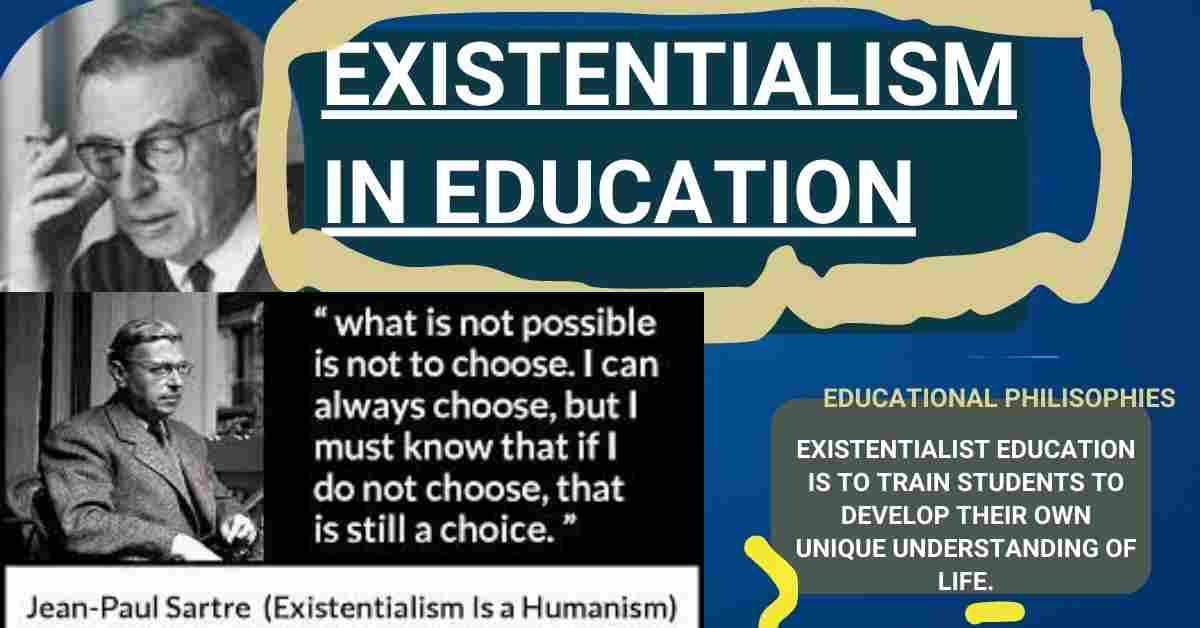Existentialism Philosophy in the broader sense is a 20th-century philosophy that is centered upon the analysis of existence and of the way humans find themselves existing in the world.
- The notion is that humans exist first and then each individual spends a lifetime changing their essence or nature
- Existentialism Philosophy is a philosophy concerned with finding the self and meaning of life through free will, choice, and personal responsibility
The belief is that people are searching to find out who and what they are throughout life as they make choices based on their experiences, beliefs, and outlook. And personal choices become unique without the necessity of an objective form of truth. An existentialist believes that a person should be forced to choose and be responsible without the help of laws, ethnic rules, or traditions.
Existentialism Philosophy in Education:
- Learner-Centered Philosophy: Focuses on student freedom and agency.
- Education for Existential Living: Aims to facilitate living an existential life.
- Embracing Individuality: Belief in the uniqueness of every individual.
Objectives of Existential Education:
- Cultivating Unique Qualities: Fostering individual potentialities.
- Harnessing Individualities: Developing unique qualities.
- Self-Paced Learning: Encouraging personalized, self-directed learning.
Existentialist Methods:
- Individual Focus: Prioritizing one-on-one interaction with teachers.
- Absence of Divine Guidance: Rejecting the notion of a higher power guiding students.
Key Tenets of Existentialism:
- Importance of Individual Experience: Emphasizing personal narratives.
- Embracing Choice: Responsibility for creating meaning in one’s life.
- Authenticity and Self-Realization: Striving for genuine self-awareness.
Goals of Existential Education:
- Cultivating Responsibility: Empowering individuals to make choices.
- Facing Tragic Situations: Developing resilience in adverse circumstances.
- Social Adjustability: Nurturing adaptability within societal contexts.
- Fostering Uniqueness: Celebrating individuality and diversity.
Characteristics of Existentialism Philosophy
It is clear from the above account that in existentialism, the human person and his freedom are given great importance. In it, the ancient personal value stressed by Stoics and Epicureans and exemplified in Socrates’ hemlock drinking has been reinterpreted.
According to existentialism, personal growth and development can occur through an individual’s efforts, and one can help him in this regard. Thus, the practical problems of living are attached to great value and importance.
Existentialism is characterized by several key principles and themes that define its philosophical perspective. Here are some of the main characteristics of Existentialism:
- Emphasis on Individual Existence: Existentialism Philosophy places a central emphasis on the individual’s existence and experience. It focuses on the subjective experience of being human, including feelings of alienation, anxiety, and freedom.
- Freedom and Choice: Existentialism Philosophy emphasizes the importance of individual liberty and choice in shaping one’s existence. It holds that individuals are responsible for creating their meaning in life through the choices they make, rather than relying on external sources of authority or predetermined destinies.
- The Absurdity of Existence: Existentialism Philosophy acknowledges the absurdity and inherent meaninglessness of human existence in an indifferent universe. It suggests that life lacks inherent purpose or meaning, and individuals must confront this existential void and create their meaning despite it.
- Authenticity and Self-Responsibility: Existentialism encourages individuals to live authentically, by being true to themselves and taking responsibility for their choices and actions. It emphasizes the importance of self-awareness, self-reflection, and personal integrity in navigating the complexities of existence.
- Angst and Dread: Existentialism Philosophy explores the existential anxiety and dread that accompany the human condition. It acknowledges the anxiety and uncertainty that arise from the awareness of one’s mortality, freedom, and responsibility and encourages individuals to confront these existential challenges with courage and authenticity.
- Individuality and Uniqueness: Existentialism Philosophy celebrates the individuality and uniqueness of each person. It rejects the idea of universal truths or values, recognizing that each individual’s experience of existence is inherently subjective and distinct.
- Existential Themes in Literature and Art: Existential themes are often explored in literature, art, and film, where characters grapple with questions of identity, meaning, and the human condition. Existentialist works often depict characters confronting existential crises and struggling to find meaning in a seemingly indifferent world.
Besides the above the following are the chief characteristics of existentialism:
Criticism on Idealism
EXISTENTIALISM PHILOSOPHY has emerged and developed as a reaction against idealism. Existentialist philosophers are highly critical of idealism and conceptualism. According to idealism human person is essentially an expression of some underlying spiritual or psychic element that is universal: that is all men are fundamentally the same and share the universal character.
It is this common character that truly defines the man. Therefore, human freedom is subject to the good of humanity in general.
There is no arbitrariness or individual will be accounting for human freedom. But the existentialists criticize idealists’ contention about universal elements and man’s good being subject to the general good. They regard the search for essence as a mistaken pursuit and according to them, it is not the essence but existence which is real.
Existentialism Philosophy Criticism on Naturalism
The existentialist philosophers are also critical of the philosophy of Naturalism. According to naturalists, life is subject to physicochemical laws, which, in turn, are subject to the universal law of causation. According to the law of causation whatever happens is due to antecedent causes and no event can appear suddenly without some or the other cause.
Thus, if the law of causation is universally operative there can be no human freedom of action. Human acts are as mechanical as the actions of an animal.
This, however, is anathema to the existentialists and they stoutly defend the freedom of man. Man is so free, according to J.P. Sartre, that he is fearful of his freedom.
Existentialism Philosophy Criticism on the Scientific Philosophy
Besides being critical of idealism and naturalism, the existentialist philosophers are also critical of scientific conceptualism. Science abstracts from the immediate data and brings them under some universal law or general rule, whereas, according to existentialists, all abstraction is false, reality is in the immediate data only.
Furthermore, with the tremendous progress in science and technology, rapid industrialization and urbanization have taken place. This has given rise to crowded towns in which an individual is lost.
Everything is done or happens on a large- scale and all personal values, individual likes, and dislikes are altogether lost sight of.
Today it is not the individual who chooses his end; rather all decisions are made by computers or statistical laws and data. Thus, science has made the value of man negligible. This is why the existentialists are opposed to scientific philosophy and culture. Indeed, the appeal of existentialist philosophy for artists and kinds of literature is due mainly to the stout opposition to science by existentialism. It is the basic belief of Existentialism Philosophy that any true philosophy must be grounded in axiology or theory of values and not in epistemology or theory of knowledge.
Born of Despair
As has been indicated above, on account of the unparalleled progress of science and technology, huge, industrial complexes and townships have sprung. Everywhere man is losing touch with nature. In big towns, the problems and inner conflicts of man have multiplied phenomenally.
The two world wars have completely shaken man’s faith in the world’s future and philosophy. With the growing application of technology and consequent increase in the mechanization of life, there is a growing despair in the minds and hearts of men. The worth of human efforts is decreasing and life is becoming like a raft on the open sea which is carried hither and thither without any definite direction.
Under these circumstances, a sensitive mind finds himself lost and forlorn. The existentialists try to analyze and describe these human predicaments and find a way out of them. The existentialist is attacked on this count as indulging in gross exaggeration and raising false alarms. While it is very true that modern life is infested with hydra-headed problems and that the intricacies of life overwhelm the spirit of man, giving up the struggle in despair and crying in settlement is no sensible solution to the current human predicament.
Rather, any intensification of the feeling of despair and hopelessness would further complicate the matter. What is needed is an intelligent and sensible compromise with the hard and harsh facts of life. If a man allows himself to be overwhelmed by misery, pain, and apparent hopelessness of the situation, he will sink into apathy and cynicism.
Thus, he would not be able to improve his situation, on the contrary, every hope of any possible way out would recede. Psychologically, such an attitude is symptomatic of hypersensitiveness and hypochondria.
Moreover, by advising a man to feel fully unremittingly responsible for his life situation, the sense of responsibility becomes abnormal and pathological. Such a man feels so intensely that he is led to commit suicide for small acts of omission and commission.
As it is true elsewhere, it is true in this context that too much of anything is bad. A sense of responsibility and duty and respect for the human person are good things, but an exaggerated version of these can produce abnormal and pathological personalities.
Value of Human Personality
From the observations made above about EXISTENTIALISM PHILOSOPHY, it is obvious that Existentialism Philosophy recognizes the paramountity of the human personality. As a matter of fact, for an existentialist, “man” is the center of the universe, and nothing else is equal to it. Even Brahman, God, the universe, etc., are subsidiary to “man”.
The basic feature of a human person is his freedom—unfettered and unrestrained. Society and social institutions are for the sake of man and not vice versa, as is believed by idealists and others. There is no “general will” to which the “individual will” is subject. If any social law or principle is restrictive of human freedom it is invalid and unjust. Anything which obstructs the growth and development of the individual must be discarded.
With this aim in view, existentialist writers, artists, and thinkers have expressed their views uncompromisingly and waged great battles for securing these freedoms for man.
Importance of Subjectivity
The Danish philosopher S. Kierkegaard has said that truth is subjective, and truth is subjectivity: objectivity and abstraction are hallucinations. While scientists lay so exclusive a stress on objectivity and consider any intrusions by subjective elements as wholly unwarranted and vicious, existentialists are extremists who believe that only the immediate feeling or apprehension reveals the truth and that abstraction in any form or manner vitiates the truth and reality.
The immediate experience or feeling about which existentialists talk is the direct experience by individuals of things like conflict, divisiveness, pain, anguish, anxiety, suffocation, etc. It is these conflicts and pains that tell a person the quality of his life and the business of philosophy is to analyze and describe these conflicts and trace their causes.
Usually, these conflicts are moral and are indicative of inauthentic existence. The various existentialists have tried to describe in minute detail the experiences like spiritual crisis, sexual crisis, marital crisis, etc. Existentialist thinking is beyond thinking and reasoning and is rooted in direct experiences and their unable descriptions.
A biographical account, if honest, sincere, and frank, usually helps in appreciating and understanding the truth of one’s situation. For example, a marital discord may be due to a lack of respect for the other spouse and too much expectation of him or her.
An honest account of such an experience may help relieve tensions in many peruses of this account by providing them insight into their problems. Everyone by probing into the depths of one’s subjectivity can discover the truth of one’s being and discover his authentic role in life. This is a creative process which gives rise to fresh insights.
The man, when he encounters his existence firsthand, stands alone. It is only when one is alone that one comes to grips with his true self. This ability to be alone, to stand by oneself, is the true freedom and this again is the basis of all morality. According to existentialists, the origin of values is not in the social situation but in the personal insight.
No Construction of Philosophical System
From ancient times philosophers have cogitated and pondered over problems of God, Soul, Space, Time, the physical world, its origin and evolution, etc. They have tried to present philosophies that embraced all these problems and developed a theoretical system. However, the existentialists distrust system-making and theorization. According to them, the true aim of philosophy is action and not theory. Therefore, they do not cogitate over traditional problems.
Emphasis on the problem of the relationship between the individual and the world
Lastly, a problem that is thought to be crucial by existentialists is the relationship between the individual and the world. The traditional explanations for this problem are not satisfactory according to existentialists. If we, after Hegel, believe in the one universal element called Absolute whose manifestation everything is, the individual has no value per se and is not free.
According to Hegel the acceptance of necessity is true freedom. This robs an individual of all freedom and. his unique quality. Such a view is repugnant to the existentialists; they, therefore, are consistently and consensusly anti-Hegelian. According to existentialists man cannot be considered subject to any law, rule, or principle, be it a universal natural, social, or political law. They are uncompromising free-willists and are extremely wary of any external encroachment upon human freedom.
The rule does not verify and authenticate the case; on the contrary, the case does verify the rule. The validity of art is in the artistic impulse and expression and not in any aesthetic theory. The worth of a man is underivable from any universal element.
The existentialist’s account of man is neither mystical nor philosophical. Man, and the world both are unbound and free. Briefly, the existentialists consider man to be the center of all value and activity. That is why their view is also called anthropocentrism.
Emphasis on the problem of inner conflict
The central problem of the modern highly complex world is not ideological but practical. It is neither relevant nor important today to win followers for a particular ideology or theory but to inspire in men a sense of responsibility and freedom. If there is this sense, the process of communication is facilitated.
The world peace cannot be accomplished by raising slogans. We require for this purpose individuals who are free, who communicate freely, and, above all, who respect their as well as other’s personalities. A fortiori 70 the peace is possible if and only if there is peace in each heart; if each man is free from inner conflicts, if each can be free from the desire to subject others to his will. That is why existentialists attach so great importance to the problem of inner conflict.
The traditional philosophies do not consider these problems philosophically worthwhile; but for existentialists, these are extremely crucial and fundamental. The source of modern philosophical issues is the feeling of alienation from the world, society as well as self. If we regard existence and thought as disparate, the problems arising out of this severance between reason and existence cannot be rationally solved. These can be resolved in practice only.
A true harmony is not a harmony of ideas or thoughts but a harmony of desires. A true philosophy is not a philosophy of substance but rather a philosophy of existence, a philosophy of immediate experiences.
The true nature of this philosophy is not thinking about the being but participating in its movement, that is commitment. The existentialist philosophy does not have any definite aim because, life being movement and flow which is not mere mechanical change but a creative advance, it is not possible to tie down life to any particular aim.
Life cannot be aimless or have an aim but only inauthentic and authentic. An authentic existence is the only aim that life has but this is not some future state but a present quality of life. An authentic life can be personal only (Shivendra, 2006).
The Aim of Education
The aim of education, according to existentialism, is the realization of inner truth. Contemporary mechanical and industrial life has alienated modern man. He is full of anxiety, frustration, fear and guilt. He is lonely though in the crowd. His individuality is corrupt. The education should make him realize his subjective consciousness. The existential aim of education is humanitarian and humanist. It aims at self-realization. It provides knowledge of self-existence. In Existentialism, the aim of education goes beyond mere academic knowledge and skill acquisition. It is centered around fostering authenticity, individual freedom, and the ability to confront existential challenges. Education in EXISTENTIALISM PHILOSOPHY encourages individuals to find meaning in their lives, take responsibility for their choices, and embrace the inherent uncertainties of existence with courage and authenticity.
| Aim of Education in Existentialism | Explanation |
|---|---|
| Fostering Authenticity | Existentialist education aims to cultivate authenticity in individuals, encouraging them to be true to themselves and their own experiences. This involves fostering self-awareness, introspection, and a willingness to confront the existential challenges of existence. |
| Encouraging Individual Freedom | Education in Existentialism Philosophy seeks to empower individuals to embrace their freedom and responsibility in shaping their own lives. It encourages students to make choices based on their own values and desires, rather than conforming to external expectations or societal norms. |
| Cultivating Meaning-Making | Existentialist education focuses on helping individuals create meaning in their lives, despite the inherent absurdity and uncertainty of existence. It encourages students to explore their passions, interests, and existential concerns, and to find purpose and significance in their own unique experiences. |
| Nurturing Responsibility | Education in EXISTENTIALISM PHILOSOPHY emphasizes the importance of taking responsibility for one’s own choices and actions. It encourages students to recognize the consequences of their decisions and to embrace their role as active agents in shaping their own destinies. |
| Embracing Existential Challenges | Existentialist education prepares individuals to confront the existential challenges of life, such as anxiety, alienation, and the search for meaning. It equips students with the resilience, courage, and self-awareness needed to navigate the complexities of existence with authenticity and integrity. |
Child-Centered Education
Existential education is child-centered. It gives full freedom to the child. The teacher should help the child to know himself and recognize his being. Freedom is required for natural development. Education should convert imperfection into perfection. Education should be according to the individual’s needs and abilities of the child. The relation of the child to himself should be strengthened by education.
Existentialist’s Curriculum
Existentialist’s approach to education is almost an inversion of the realist approach. In the field of curriculum, while the realists exclusively emphasize science, the existentialists find out that science and objective education sever our relation with ourselves. Science cannot help in the inner realization and achievement of peace.
This, however, does not mean that science education should be ignored. It only means that besides science the curriculum must include humanities, ethics, and religion. In keeping with this viewpoint contemporary engineering colleges have included some philosophy, ethics, and social studies, in their curriculum. Without this synthetic approach to curriculum, the aim of character formation and personality development will be defeated.
The curriculum reflects a holistic approach, integrating scientific knowledge with humanities, ethics, religion, philosophy, and social studies to promote self-awareness, critical thinking, and character development in alignment with existentialist principles.
| Subject | Content |
|---|---|
| Science | Emphasizes understanding of natural phenomena and laws |
| Humanities | Explores literature, art, history, and philosophy |
| Ethics | Examines moral principles and values |
| Religion | Studies various religious traditions and spiritual beliefs |
| Philosophy | Encourages critical thinking and reflection on existence |
| Social Studies | Investigates societal structures, cultures, and relationships |
Contribution to Education
EXISTENTIALISM PHILOSOPHY developed as a reaction against the contemporary social, economic, and political situation in which man has lost his self. This philosophy has widely influenced art and literature. In politics, it has stood against war. Its followers are active pacifists. In the field of education, the contribution of EXISTENTIALISM PHILOSOPHY is as follows:
1. Total development. Existentialists have aimed at the total development of personality through education. Education should aim at the whole man. It should aim at character formation and self-realization.
2. Subjective knowledge. The present age of science has made too much of objective knowledge, so much so that the term subjective has come to mean unreal, non-sense, ignorant, and irrelevant. The existentialists rightly point out that subjective knowledge is even more important than objective knowledge.
They rightly hold that truth is subjectivity. It is a human value and values are not facts. The reduction of values to facts has led to a widespread loss of faith in values. Therefore, along with the teaching of science and mathematics, the humanities, art, and literature should also be given a suitable place in the curriculum at every stage of education. Most of the ills of modern man are due to an over-objective attitude. This requires a subjectivist correction in the light of existentialist ideas.
3. Importance of environment. The present industrial, economic, political, and social environment is valueless. Therefore, it helps confusion and corruption, tensions and conflicts. Existentialists seek to provide an environment proper to self-development and self-consciousness. This environment in the school requires contributions from humanities, arts, and literature. These will help in the development of individuality in education so that he may cease to become a cog in the social wheel. Rather he should develop to be a self-conscious and sensitive individual.
SELF-ASSESSMENT QUESTIONS
- Define Naturalism, Pragmatism and Existentialism.
Naturalism: Naturalism is a philosophical viewpoint that suggests that the natural world, governed by natural laws, is all that exists. It denies the existence of supernatural or spiritual realities, focusing instead on empirical evidence and scientific methods to understand the universe. In literature and the arts, naturalism often portrays human beings as subject to the same forces and conditions as other natural phenomena, emphasizing determinism and the influence of the environment on human behavior.
Pragmatism: Pragmatism is a philosophical approach that emphasizes the practical consequences of beliefs, actions, and theories. It asserts that the truth or value of an idea is determined by its usefulness or efficacy in achieving desired outcomes. Pragmatists prioritize experimentation, problem-solving, and adaptation, viewing knowledge as evolving and context-dependent rather than fixed or absolute. Influential pragmatist thinkers include William James, John Dewey, and Charles Sanders Peirce.
Existentialism: Existentialism is a philosophical and literary movement that explores the individual’s experience of existence and the search for meaning in an inherently absurd or indifferent universe. Existentialist thinkers emphasize individual freedom, choice, and responsibility, rejecting external sources of meaning such as religion or societal norms. Existentialism often grapples with themes of anxiety, alienation, authenticity, and the human condition, encouraging individuals to confront the existential challenges of existence and create their own meaning in life. Prominent existentialist philosophers include Jean-Paul Sartre, Søren Kierkegaard, and Friedrich Nietzsche.
- Identify the similarities and differences between Naturalism, Pragmatism, and Existentialism.
While Naturalism, Pragmatism, and Existentialism are distinct philosophical approaches, they also share some similarities and differences:
Similarities Between Naturalism, Pragmatism, and Existentialism
Focus on Human Experience: All three philosophies prioritize the human experience and individual perspective in their analyses of reality and knowledge.
Reject Traditional Metaphysics: Naturalism, Pragmatism, and Existentialism tend to reject traditional metaphysical explanations, such as religious or supernatural interpretations, in favor of empirical evidence, practical consequences, or individual subjective experiences.
Emphasis on Empiricism: Naturalism and Pragmatism both emphasize empiricism, relying on observation, experimentation, and scientific methods to understand the world. Existentialism, while not inherently empirical, often acknowledges the importance of lived experience and personal perception.
Critique of Absolute Truth: Pragmatism and Existentialism both challenge the notion of absolute truth or fixed principles, instead emphasizing the contextual and evolving nature of knowledge and values.
Differences Between Naturalism, Pragmatism, and Existentialism:
Approach to Truth and Knowledge:
Naturalism: Prioritizes empirical evidence and scientific methods to uncover truths about the natural world.
Pragmatism: Values the practical consequences and utility of beliefs and theories, emphasizing problem-solving and experimentation.
Existentialism: Focuses on subjective experiences and individual interpretations of reality, rejecting the notion of objective truth in favor of personal meaning-making.
Attitude Toward Human Freedom:
Naturalism: Often portrays humans as determined by natural forces, with limited agency or freedom.
Pragmatism: Emphasizes human agency and the capacity to shape reality through intentional action and decision-making.
Existentialism: Celebrates human freedom and individual choice, viewing existence as inherently open-ended and contingent upon personal decisions.
Treatment of Ethics and Values:
Naturalism: Ethics may be grounded in natural laws or evolutionary principles, emphasizing survival and adaptation.
Pragmatism: Values and moral principles are evaluated based on their practical consequences and social utility.
Existentialism: Ethics are seen as subjective and contingent upon individual choice, emphasizing authenticity, responsibility, and the creation of personal meaning.
View of Human Nature:
Naturalism: Tends to view humans as part of the natural world, subject to deterministic forces and biological influences.
Pragmatism: Emphasizes the creative and adaptive capacity of humans to shape their environment and construct knowledge.
Existentialism: Highlights the unique and subjective nature of human existence, emphasizing individuality, freedom, and the struggle to find meaning in a seemingly indifferent universe.
- Analyze classroom practices at the secondary level based on Naturalism, Pragmatism, and Existentialism
Let’s analyze classroom practices at the secondary level based on Naturalism, Pragmatism, and Existentialism:
Naturalism:
- Teaching Methodology: Naturalism in education emphasizes the use of scientific methods and empirical evidence to understand the world. In the classroom, this could manifest through hands-on experiments, observation-based learning, and inquiry-based activities.
- Curriculum Design: Naturalistic educators may prioritize subjects like biology, environmental science, and physics, focusing on the natural world and its phenomena. They may also incorporate field trips and outdoor learning experiences to connect students with nature.
- Student Engagement: Naturalistic classroom practices aim to engage students by fostering curiosity and exploration. Teachers encourage students to ask questions, conduct experiments, and make observations, allowing them to discover scientific principles firsthand.
- Assessment: Assessment methods in a naturalistic classroom might include lab reports, research projects, and experiments. Students are evaluated based on their ability to apply scientific concepts, gather data, and draw conclusions from observations.
Pragmatism:
- Teaching Methodology: Pragmatism emphasizes practical, experiential learning that is relevant to students’ lives. Classroom activities may focus on problem-solving, critical thinking, and real-world application of knowledge.
- Curriculum Design: Pragmatic educators design curricula that are flexible and responsive to students’ needs and interests. They may incorporate project-based learning, interdisciplinary studies, and opportunities for students to explore their passions and career interests.
- Student Engagement: Pragmatic classroom practices aim to actively engage students in the learning process. Teachers facilitate discussions, group projects, and hands-on activities that encourage collaboration and creativity.
- Assessment: Assessment in a pragmatic classroom often includes performance-based tasks, portfolios, and presentations. Students are evaluated not only on their knowledge and skills but also on their ability to apply what they’ve learned to solve real-world problems.
Existentialism:
- Teaching Methodology: Existentialism in education emphasizes personal choice, freedom, and authenticity. Classroom practices focus on fostering self-reflection, individuality, and personal growth.
- Curriculum Design: Existentialist educators may design curricula that allow students to explore existential themes such as identity, meaning, and freedom. They may incorporate literature, philosophy, and art that provoke existential questions and encourage students to reflect on their own values and beliefs.
- Student Engagement: Existentialist classroom practices aim to empower students to take ownership of their learning and make meaningful choices. Teachers act as facilitators, encouraging students to explore their interests, passions, and existential concerns.
- Assessment: Assessment methods in an existentialist classroom may include reflective journals, self-assessments, and projects that allow students to express their individuality and explore existential themes. Students are evaluated based on their ability to engage critically with existential questions and develop a sense of personal authenticity and responsibility.
- Evaluate the science curriculum of the SSC level based on pragmatics
To evaluate the science curriculum of the SSC (Secondary School Certificate) level based on Pragmatism, we need to consider how well it aligns with the key principles and practices of Pragmatist philosophy. Here’s how the evaluation might look:
- Relevance and Real-World Application: Pragmatism emphasizes the practical application of knowledge to real-life situations. The science curriculum should incorporate examples, case studies, and experiments that demonstrate the relevance of scientific concepts to students’ lives. It should emphasize problem-solving skills and critical thinking abilities that can be applied beyond the classroom.
- Interdisciplinary Approach: Pragmatism encourages an interdisciplinary approach to learning. The science curriculum should integrate concepts from other disciplines, such as mathematics, technology, and engineering, to provide a holistic understanding of scientific phenomena. It should also incorporate current issues and developments in science, allowing students to explore the interconnectedness of different fields.
- Experiential Learning: Pragmatism advocates for hands-on, experiential learning experiences. The science curriculum should include laboratory experiments, field trips, and project-based activities that engage students in active exploration and discovery. These experiences should encourage collaboration, problem-solving, and critical inquiry, fostering a deeper understanding of scientific principles.
- Flexibility and Adaptability: Pragmatism values flexibility and adaptability in education. The science curriculum should be dynamic and responsive to students’ needs, interests, and learning styles. It should provide opportunities for students to pursue their own inquiries, investigate areas of personal interest, and engage in self-directed learning experiences.
- Assessment Methods: Pragmatic assessment methods focus on evaluating students’ ability to apply their knowledge to solve real-world problems. The science curriculum should include a variety of assessment tools, such as project-based assessments, performance tasks, and practical demonstrations, that measure students’ problem-solving skills, critical thinking abilities, and scientific inquiry skills.
Overall, the evaluation of the science curriculum at the SSC level based on Pragmatism would assess how effectively it promotes relevance, interdisciplinary learning, experiential learning, flexibility, and authentic assessment practices. It would also consider how well it prepares students to apply scientific knowledge and skills to address complex challenges in the real world.
- Describe the main tenets of Naturalism
Naturalism is a philosophical perspective that emphasizes the importance of nature and natural laws in explaining the world and human behavior. Here are the main tenets of Naturalism:
- Materialism: Naturalism holds that the material world, composed of matter and energy, is the only reality. It rejects the existence of supernatural or spiritual entities, emphasizing that everything can be explained through natural causes and scientific inquiry.
- Determinism: Naturalism posits that all events, including human actions and behaviors, are determined by natural laws and prior causes. Human behavior is seen as the result of biological, environmental, and social factors, rather than free will or supernatural forces.
- Empiricism: Naturalism emphasizes the importance of empirical evidence and observation in understanding the world. Knowledge is gained through sensory experiences and scientific methods, rather than intuition, revelation, or faith.
- Evolutionary Theory: Naturalism is often associated with evolutionary theory, which explains the diversity of life through the process of natural selection. Naturalists view humans as products of biological evolution, subject to the same principles of adaptation and survival as other organisms.
- Unity of Science: Naturalism advocates for a unified approach to science, viewing all branches of science as interconnected and mutually reinforcing. It seeks to explain phenomena across different domains, from physics and chemistry to biology and psychology, using consistent principles and methods.
- Reductionism: Naturalism tends to reduce complex phenomena to simpler components or underlying processes. It seeks to explain higher-level phenomena, such as consciousness or morality, in terms of underlying biological, psychological, or social mechanisms.
- Value of Objectivity: Naturalism values objectivity in scientific inquiry, striving to minimize bias and subjective interpretation. It emphasizes the importance of empirical evidence, peer review, and falsifiability in establishing scientific knowledge.
Overall, Naturalism provides a framework for understanding the world based on natural laws, empirical evidence, and scientific inquiry, rejecting supernatural explanations and emphasizing the interconnectedness of all phenomena.
- Evaluate the role of modern philosophies in education
The role of modern philosophies in education is significant as they provide frameworks and perspectives that inform pedagogical approaches, curriculum design, and educational practices. Here’s an evaluation of their role:
- Personalized Learning: Modern philosophies such as Constructivism, Existentialism, and Pragmatism emphasize the importance of personalized learning experiences tailored to individual needs, interests, and abilities. This has led to the adoption of student-centered approaches in education, where learners are actively engaged in the learning process and encouraged to take ownership of their education.
- Critical Thinking and Problem-Solving: Philosophies like Pragmatism and Critical Pedagogy emphasize the development of critical thinking skills and the ability to solve real-world problems. These philosophies promote inquiry-based learning, project-based approaches, and collaborative activities that challenge students to think critically, analyze information, and apply knowledge in meaningful contexts.
- Cultural Relevance and Diversity: Modern philosophies in education, such as Multiculturalism and Postcolonialism, highlight the importance of cultural relevance and diversity in the curriculum. They advocate for the inclusion of diverse perspectives, histories, and voices in education to promote equity, social justice, and respect for cultural differences.
- Technology Integration: Contemporary philosophies recognize the transformative role of technology in education. Philosophies like Connectivism emphasize the importance of digital literacy, online collaboration, and the use of technology-enhanced learning environments to facilitate knowledge acquisition and networked learning experiences.
- Ethical and Moral Development: Philosophies such as Ethics of Care and Character Education emphasize the importance of ethical and moral development in education. They promote values such as empathy, compassion, integrity, and social responsibility, fostering the holistic development of students as ethical individuals and responsible citizens.
- Flexibility and Adaptability: Modern philosophies advocate for flexible and adaptive approaches to education that respond to the changing needs of learners and society. This includes embracing lifelong learning, promoting interdisciplinary studies, and encouraging experimentation and innovation in educational practices.
Modern philosophies play a crucial role in shaping educational theories, policies, and practices by providing frameworks that prioritize student-centered learning, critical thinking, cultural diversity, ethical development, and technological innovation. By integrating these philosophies into educational contexts, educators can create more inclusive, engaging, and effective learning experiences that prepare students for success in a rapidly changing world.








[…] Existentialism is a philosophy that emphasizes individual freedom and choice. It is student-centered, and the focus is on developing students’ personal and social identities. Existentialists believe that education should be focused on the individual student’s needs, interests, and experiences. […]
[…] Existentialism is a philosophy that emphasizes individual freedom and choice. It is student-centered, and the focus is on developing students’ personal and social identities. Existentialists believe that education should be focused on the individual student’s needs, interests, and experiences. […]
[…] the emergence of diverse philosophical movements and schools of thought, from German idealism and existentialism to pragmatism and analytic philosophy. Figures like Friedrich Nietzsche, Søren Kierkegaard, Jean-Paul Sartre, Ludwig Wittgenstein, and […]